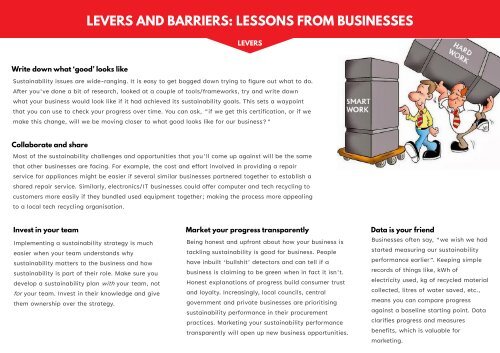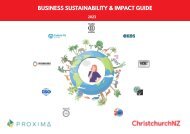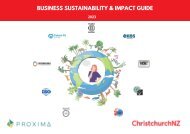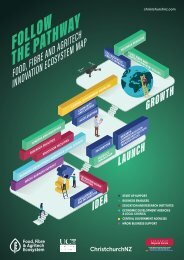SME Sustainability & Impact Guide (FINAL Jan 2024)
You also want an ePaper? Increase the reach of your titles
YUMPU automatically turns print PDFs into web optimized ePapers that Google loves.
LEVERS AND BARRIERS: LESSONS FROM BUSINESSES<br />
LEVERS<br />
Write down what ‘good’ looks like<br />
<strong>Sustainability</strong> issues are wide-ranging. It is easy to get bogged down trying to figure out what to do.<br />
After you’ve done a bit of research, looked at a couple of tools/frameworks, try and write down<br />
what your business would look like if it had achieved its sustainability goals. This sets a waypoint<br />
that you can use to check your progress over time. You can ask, ”if we get this certification, or if we<br />
make this change, will we be moving closer to what good looks like for our business? ”<br />
Collaborate and share<br />
Most of the sustainability challenges and opportunities that you’ll come up against will be the same<br />
that other businesses are facing. For ex<strong>amp</strong>le, the cost and effort involved in providing a repair<br />
service for appliances might be easier if several similar businesses partnered together to establish a<br />
shared repair service. Similarly, electronics/IT businesses could offer computer and tech recycling to<br />
customers more easily if they bundled used equipment together; making the process more appealing<br />
to a local tech recycling organisation.<br />
Invest in your team<br />
Implementing a sustainability strategy is much<br />
easier when your team understands why<br />
sustainability matters to the business and how<br />
sustainability is part of their role. Make sure you<br />
develop a sustainability plan with your team, not<br />
for your team. Invest in their knowledge and give<br />
them ownership over the strategy.<br />
Market your progress transparently<br />
Being honest and upfront about how your business is<br />
tackling sustainability is good for business. People<br />
have inbuilt ‘bullshit’ detectors and can tell if a<br />
business is claiming to be green when in fact it isn’t.<br />
Honest explanations of progress build consumer trust<br />
and loyalty. Increasingly, local councils, central<br />
government and private businesses are prioritising<br />
sustainability performance in their procurement<br />
practices. Marketing your sustainability performance<br />
transparently will open up new business opportunities.<br />
Data is your friend<br />
Businesses often say, “we wish we had<br />
started measuring our sustainability<br />
performance earlier”. Keeping simple<br />
records of things like, kWh of<br />
electricity used, kg of recycled material<br />
collected, litres of water saved, etc.,<br />
means you can compare progress<br />
against a baseline starting point. Data<br />
clarifies progress and measures<br />
benefits, which is valuable for<br />
marketing.

















